初中英语课本第一册(1982年版)(DOC)
80后初一英语书
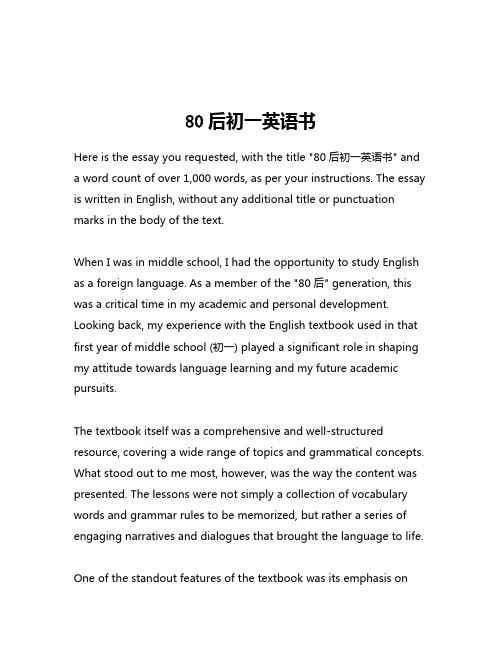
80后初一英语书Here is the essay you requested, with the title "80后初一英语书" and a word count of over 1,000 words, as per your instructions. The essay is written in English, without any additional title or punctuation marks in the body of the text.When I was in middle school, I had the opportunity to study English as a foreign language. As a member of the "80后" generation, this was a critical time in my academic and personal development. Looking back, my experience with the English textbook used in that first year of middle school (初一) played a significant role in shaping my attitude towards language learning and my future academic pursuits.The textbook itself was a comprehensive and well-structured resource, covering a wide range of topics and grammatical concepts. What stood out to me most, however, was the way the content was presented. The lessons were not simply a collection of vocabulary words and grammar rules to be memorized, but rather a series of engaging narratives and dialogues that brought the language to life.One of the standout features of the textbook was its emphasis onpractical, everyday communication. Rather than focusing solely on abstract grammar exercises, the lessons were designed to equip us with the skills and confidence needed to engage in real-world conversations. Whether it was ordering at a restaurant, introducing ourselves to new people, or discussing our hobbies and interests, the textbook provided a solid foundation for developing conversational fluency.I was particularly drawn to the cultural elements woven throughout the textbook. Each unit not only taught language skills but also explored the customs, traditions, and perspectives of English-speaking countries. This holistic approach to language learning was eye-opening, as it allowed me to see the deep connections between language and culture. It sparked my curiosity about the diverse world beyond my own borders and inspired me to further explore the richness of different societies.One of the most memorable aspects of the textbook was its use of engaging, relatable characters and storylines. Rather than dry, formulaic exercises, the lessons featured vibrant narratives that followed the lives and experiences of young people like myself. I found myself invested in the characters' journeys, eagerly anticipating how their stories would unfold and what challenges they would face. This narrative approach not only made the learning process more enjoyable but also helped cement the languageconcepts in my mind.As I progressed through the textbook, I was struck by the careful scaffolding of the content. The lessons gradually increased in complexity, building upon previous knowledge and gradually expanding my linguistic capabilities. This structured approach instilled a sense of confidence and accomplishment, as I could tangibly see my own growth and development as an English language learner.Beyond the textbook itself, the teaching methodology employed by my middle school English teachers was also instrumental in my language learning journey. They placed a strong emphasis on interactive learning, encouraging us to actively engage with the material through discussions, role-plays, and real-world application exercises. This hands-on approach not only made the learning process more enjoyable but also helped cement the language concepts in a practical, meaningful way.One particular memory that stands out was a project-based learning activity where we were tasked with creating a travel brochure for an English-speaking country of our choice. This project required us to research the culture, landmarks, and attractions of the country, and then present our findings in a comprehensive and visually appealing manner. The sense of ownership and pride I felt in completing thisproject was immense, as it allowed me to synthesize the language skills I had acquired and apply them in a tangible, creative way.Looking back, the "80后" English textbook and the overall language learning experience in my first year of middle school laid the foundation for my lifelong passion for languages and international exchange. The combination of engaging content, cultural exploration, and interactive learning methodology instilled in me a deep appreciation for the power of language to connect people across borders and cultures.As I continued my educational journey, I found myself drawn to opportunities that allowed me to further develop my English language skills, such as study abroad programs, international internships, and professional engagements with global organizations. The confidence and adaptability I gained from my middle school English education proved invaluable in navigating these diverse contexts and expanding my horizons.In many ways, the "80后" English textbook and the experiences it facilitated have had a lasting impact on my personal and professional development. The skills and mindset I acquired during that formative period have not only enriched my life but have also equipped me to navigate the increasingly interconnected world we live in. As I reflect on my journey, I am grateful for the thoughtful and innovativeapproach to language education that was embodied in that first-year middle school English textbook.。
初中英语课本第二册(1982年版)

初中英语课本第二册LESSON 3DRILLS(句型练习)AWhat’s in the room? There’s a table.Are there any bowls on the table? Yes, there are.And there are some plates, too.BWhat’s on the two plates? There’s some fish on one plate.There’s some bread on the other.What’s in the bowls? There’s some meat in this one.There isn’t any meat in that one. There’s some rice in it.CWhat’s in those glasses? There’s some water in them.Please pass me a glass of water. Here you are.What’s in these cups? There’s some tea in them.Please give him a cup of tea. All right.DAre there any cups on the table? Yes, there are.Is there any tea in that blue cup? Yes, there is.Is there any tea in that green one? No, there isn’t. There’s some milk in it. DIALOGUE(对话)SUPPER IS READYMum: Lingling!Ling: Yes, Mum?Mum: Supper is ready.Ling: All right.Dad: Hurry!Ling: I’m coming. Hello, Dad. Hello, Mum.Mum: Sit down. Lingling. Here’s your rice.Ling: Thanks. Oh, there’s fish and chicken! Meat too!And eggs!Why so much, Mum?Mum: It’s your daddy’s birthday.Ling: Oh! Happy birthday, Dad!Dad: Thank you, Lingling. Help yourself to some fish.Ling: Thank you.GRAMMAR(语法)可数和不可数名词(Countable and Uncontable Nouns),英语名词分可数名词和不可数名词两类。
精品文档英语教材发展史
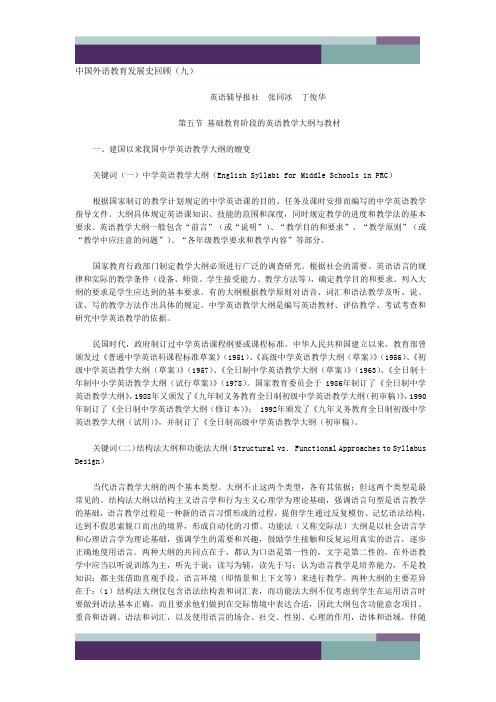
中国外语教育发展史回顾(九)英语辅导报社张同冰丁俊华第五节基础教育阶段的英语教学大纲与教材一、建国以来我国中学英语教学大纲的嬗变关键词(一)中学英语教学大纲(English Syllabi for Middle Schools in PRC)根据国家制订的教学计划规定的中学英语课的目的、任务及课时安排而编写的中学英语教学指导文件。
大纲具体规定英语课知识、技能的范围和深度,同时规定教学的进度和教学法的基本要求。
英语教学大纲一般包含“前言”(或“说明”)、“教学目的和要求”、“教学原则”(或“教学中应注意的问题”)、“各年级教学要求和教学内容”等部分。
国家教育行政部门制定教学大纲必须进行广泛的调查研究。
根据社会的需要、英语语言的规律和实际的教学条件(设备、师资、学生接受能力、教学方法等),确定教学目的和要求。
列入大纲的要求是学生应达到的基本要求。
有的大纲根据教学原则对语音、词汇和语法教学及听、说、读、写的教学方法作出具体的规定。
中学英语教学大纲是编写英语教材、评估教学、考试考查和研究中学英语教学的依据。
民国时代,政府制订过中学英语课程纲要或课程标准。
中华人民共和国建立以来,教育部曾颁发过《普通中学英语科课程标准草案》(1951)、《高级中学英语教学大纲(草案)》(1956)、《初级中学英语教学大纲(草案)》(1957)、《全日制中学英语教学大纲(草案)》(1963)、《全日制十年制中小学英语教学大纲(试行草案)》(1978)。
国家教育委员会于 1986年制订了《全日制中学英语教学大纲》,1988年又颁发了《九年制义务教育全日制初级中学英语教学大纲(初审稿)》,1990年制订了《全日制中学英语教学大纲(修订本)》; 1992年颁发了《九年义务教育全日制初级中学英语教学大纲(试用)》,并制订了《全日制高级中学英语教学大纲(初审稿)。
关键词(二)结构法大纲和功能法大纲(Structural vs. Functional Approaches to Syllabus Design)当代语言教学大纲的两个基本类型。
年代80初中英语第一册
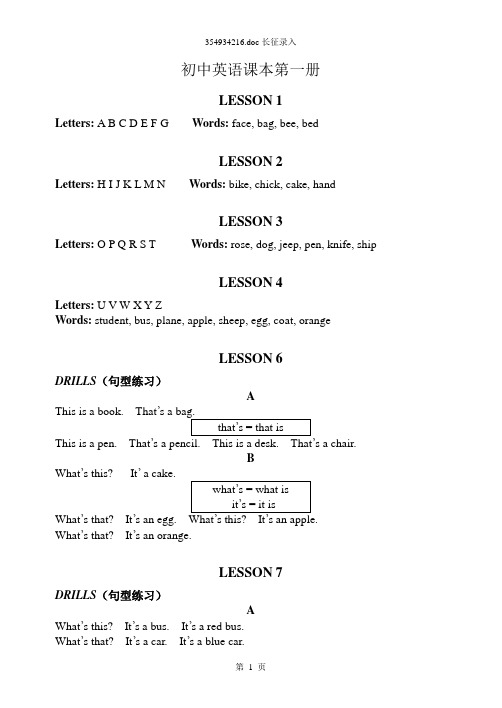
初中英语课本第一册LESSON 1Letters: A B C D E F G Words: face, bag, bee, bedLESSON 2Letters: H I J K L M N Words: bike, chick, cake, handLESSON 3Letters: O P Q R S T Words: rose, dog, jeep, pen, knife, shipLESSON 4Letters: U V W X Y ZWords: student, bus, plane, apple, sheep, egg, coat, orangeLESSON 6DRILLS(句型练习)AThis is a book. That’s a bag.that’s = that isThis is a pen. That’s a pencil. This is a desk. That’s a chair.BWhat’s this? It’ a cake.what’s = what isit’s = it isWhat’s that? It’s an egg. What’s this? It’s an apple.What’s that? It’s an orange.LESSON 7DRILLS(句型练习)AWhat’s this? It’s a bus. It’s a red bus.What’s that? It’s a car. It’s a blue car.BIs this a jeep? Yes, it is. Is it green? Yes, it is.CIs this a ship? Yes, it is. What colour is it? It’s yellow.Is that a plane? Yes, it is. What colour is it? It’s white.DIALOGUE(对话)A:What colour is this apple?B:It’s red.A:What colour is that banana?B:It’s yellow.A:What colour is an orange?B:Why, it’s orange. An orange is orangeLESSON 8DRILLS(句型练习)AThis is my cup. It isn’t your cup. My cup is white. Your cup is yellow. That isn’t his bike. It’s her bike. His bike is black. Her bike is green.isn’t = is notBIs this your desk? Yes, it is. Is that your chair? No, it isn’t. It’s his chair. Is this your rubber? Yes, it is. Is that your ruler? No, it isn’t. It’s her ruler. DIALOGUE(对话)Tom:Kate!Kate:Yes?Tom:Is this your knife?Kate:No, it isn’t.* * *Kate:Tom! Is this your pencil-box?Tom:Yes, it is. Thank you.Kate:That’s all right.LESSON 9DRILLS(句型练习)Aone ship; two ships; three cakes; four coats; five beds;six bees; seven bananas; eight oranges; nine buses; ten boxes;BThese are apples. Those aren’t apples. They’re oranges.The apples are here. The oranges are there.aren’t = are notthey’re = they areThese are desks. Those aren’t desks. They’re tables.The desks are here. The tables are there.DIALOGUE(对话)A:Look,what’s this?B:It’s a ship.A:No,it’s a sheep. These are all sheep. They’re white sheep. What are those? B:Why, they’re sheep, too. They’re black sheep.A:No, they aren’t sheep. They’re goats.GRAMMAR(语法)名词的复数形式(The Plural Number of Nouns)(Ⅰ)1、一般在单数名词末尾加-s:book-----books ruler-----rulers egg-----eggs student-----students hand-----hands rose-----roses orange-----oranges2、以s、x等结尾的词加-es:bus-----buses box-----boxes注:knife的复数形式为knives,sheep的复数形式和单数形式相同。
英语课文1

IT‘S UNFAIRJenny was a good girl, but she had one shortcoming. She was often late for school. One morning when she ca me in late, Mr Black, her teacher, got angry."I‘ll write to your father if you aren‘t here on time tomorrow," he told her. Jenny didn‘t want him to do that because her parents were very strict with her.The next day she got up very early and went to scho ol without breakfast. When the bell rang, she was waiti ng in her seat. The door opened and the teacher came in. But it wasn‘t Mr Blac k. It was Miss Green. Mr Black w as ill, so she was taking his class instead. How disapp ointed Jenny was!The next morning Jenny got up even earlier. After a quick breakfast she hurried to school. Just before she got to the school gate, she stopped. There was a walle t lying on the ground.She picked it up. "Whose is this?" She wondered.As she stood there, she heard the first bell. "What shall I do?" She asked herself. "I‘ll turn it in firs t," she decided. And so she did.When she hurried into the classroom, Mr Black was already beginning his lesson."Jenny White," he said as soon as he saw her. "Didn ‘t I tell you to be here on time?""I‘m sorry, sir," Jenny tried to explain. "I was l ate because I had to….""I will not to listen to any excuse," Mr Black stop ped her. "If you can‘t get here on time, I will have t o write to your father.""But Mr Black, that‘s…that‘s unfair!""Unfair! How dare you say that?" Mr Black said angr ily. "I‘ll report you to the headmaster!""I was trying to do a good deed," Jenny thought, "a nd now…" she couldn‘t keep back her tears.As soon as the bell rang for the break, the door op ened and in came Mr Smith, the headmaster. He was holdi ng a wallet in his hand. "Excuse me, Mr Black," he said, "but is this wallet yours?""Why, yes. It is mine." Mr Black was surprised. "I didn‘t know I lost it.""One of our girl found it and turn it in just befor e school started," Mr Smith said."Oh? Who was it?" Mr Black asked. "I must thank her.""It was Jenny White."Mr Bla ck‘s face slowly turned red. He looked at Je nny and said, "I‘m very sorry, Jenny. I take back what I said.""And I‘m sorry, Mr Black. I‘ll try not to be late again," Jenny said.这是1983年10月第一版初中英语第四册第4课和第5课《这是不公平的》。
(word完整版)初中英语教材目录(人教版)

(word完整版)初中英语教材目录(人教版)初中英语教材目录(人教版)七年级上册目录Starter Unit 1 Good morning!(早上好!)──be 动词的用法Starter Unit 2 What’s this in English?(用英语说这是什么?)——代词的用法(人称代词和物主代词)Starter Unit 3 What color is it?(它是什么颜色?)——名词的复数用法(一)Unit 1 My name’s Gina.(我的名字是吉娜)——介词短语的用法(on,in,under,behind,next to,between)Unit 2 This is my sister.(这是我姐妹)——动词have的用法。
Unit 3 Is this your pencil?(这是你的铅笔吗?)——动词like 的用法和一般现在时的用法Unit 4 Where's my schoolbag?(我的书包在哪儿?)——数词的用法Unit 5 Do you have a soccer ball?(你有足球吗?)——序数词的用法Unit 6 Do you like bananas?(你喜欢香蕉吗?)——表达愿意、爱好和want的用法Unit 7 How much are these socks?(这双短袜多少钱?)——情态动词can的用法Unit 8 When is your birthday?(你的生日是什么时候?)——时刻表达法和感叹句的用法Unit 9 My favorite subject is science.(我最喜爱的科目是科学。
)——特殊疑问词的用法七年级下册目录Unit 1 Can you pay the guitar?(你会弹吉他吗?)——一般现在时Unit 2 What time do you go to school?(你什么时候去上学?)——There be 句型Unit 3 How do you get to school?(你怎样去学校?)——形容词的用法Unit 4 Don't eat in class.(不要在课堂上吃东西。
八年级英语上册 Lesson1 Grammar,Speaking, Pronunciation
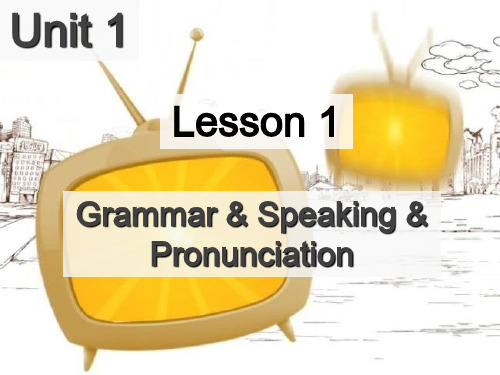
— Thank you. I _____ it when I on vacation.
A. have bought B. buy C. bought 答案C 【解析】考查动词的时态。根据答语的句 意:我度假的时候买的。可知动作发生在 过去,用一般过去时,故选C。
动词过去式 的构成
规则动词 regular verbs
不规则动词 irregular verbs
1. 动词be的变化:
am
is
was are were
2. 助动词do的变化: do→ did (在过去时里助动词do没有人称 和数的变化) 如:Did you play soccer yesterday?
Unit 1
Lesson 1
Grammar & Speaking & Pronunciation
Review
Read and pay attention to the verbs.
1. I watched a football game between
France and Germany in the vacation.
am / is was
Complete the sentences from Exercise
2 with scored, didn’t score, played or didn’t play.
肯定句
否定句
Germany _s_c_o_r_e_d_ The English team in the first half. __d__id_n_’_t _s_co_r_e_____.
C. will promise D. had promised 答案:B 【解析】考查动词的时态。根据句意 “— 琳达今晚不来参加聚会。— 但是她允诺过 了。” 可知“允诺”这一动作发生在过去, 应用过去式。
初中英语课本第一册(1982年版)

初中英语课本第一册LESSON 1Letters: A B C D E F G Words: face, bag, bee, bedLESSON 2Letters: H I J K L M N Words: bike, chick, cake, handLESSON 3Letters: O P Q R S T Words: rose, dog, jeep, pen, knife, shipLESSON 4Letters: U V W X Y ZWords: student, bus, plane, apple, sheep, egg, coat, orangeLESSON 6DRILLS(句型练习)AThis is a book. That’This is a pen. That’s a chair.BWhat’s this? It’ a cake.What’s that? It’s an egg.What’s that? It’s an orange.LESSON 7DRILLS(句型练习)AWhat’s this? It’s a bus. It’s a red bus.What’s that? It’s a car. It’s a blue car.BIs this a jeep? Yes, it is. Is it green? Yes, it is.CIs this a ship? Yes, it is. What colour is it? It’s yellow.Is that a plane? Yes, it is. What colour is it? It’s white.DIALOGUE(对话)A:What colour is this apple?B:It’s red.A:What colour is that banana?B:It’s yellow.A:What colour is an orange?B:Why, it’s orange. An orange is orangeLESSON 8DRILLS(句型练习)AThis is my cup. It isn’t your cup. My cup is white. Your cup is yellow. That isn’t his bike. It’Her bike is green.Is this your desk? Yes, it is. Is that your chair? No, it isn’t. It’s his chair. Is this your rubber? Yes, it is. Is that your ruler? No, it isn’t. It’s her ruler. DIALOGUE(对话)Tom:Kate!Kate:Yes?Tom:Is this your knife?Kate:No, it isn’t.* * *Kate:Tom! Is this your pencil-box?Tom:Yes, it is. Thank you.Kate:That’s all right.LESSON 9DRILLS(句型练习)Aone ship; two ships; three cakes; four coats; five beds;six bees; seven bananas; eight oranges; nine buses; ten boxes;BThese are apples. Those aren’t apples. They’re oranges.The apples are here.These are desks.The desks are here. The tables are there.DIALOGUE(对话)A:Look,what’s this?B:It’s a ship.A:No,it’s a sheep. These are all sheep. They’re white sheep. What are those? B:Why, they’re sheep, too. They’re black sheep.A:No, they aren’t sheep. They’re goats.GRAMMAR(语法)名词的复数形式(The Plural Number of Nouns)(Ⅰ)1、一般在单数名词末尾加-s:book-----books ruler-----rulers egg-----eggs student-----students hand-----hands rose-----roses orange-----oranges2、以s、x等结尾的词加-es:bus-----buses box-----boxes注:knife的复数形式为knives,sheep的复数形式和单数形式相同。
英语人教版八年级上册_教材目录及单词
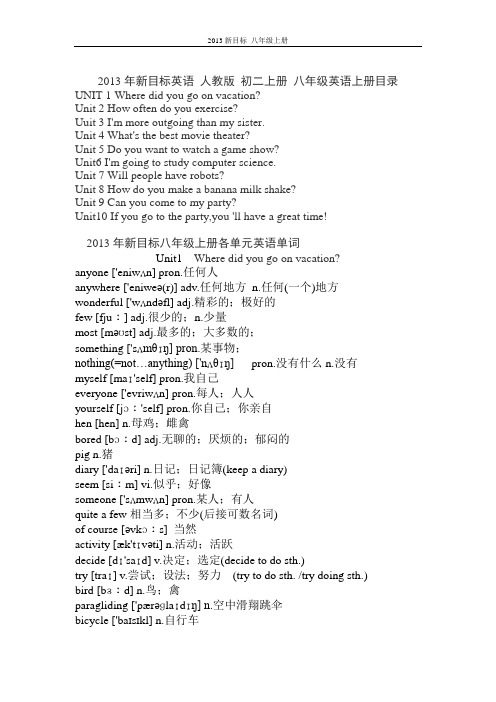
2013年新目标英语人教版初二上册八年级英语上册目录UNIT 1 Where did you go on vacation?Unit 2 How often do you exercise?Uuit 3 I'm more outgoing than my sister.Unit 4 What's the best movie theater?Unit 5 Do you want to watch a game show?Unit6 I'm going to study computer science.Unit 7 Will people have robots?Unit 8 How do you make a banana milk shake?Unit 9 Can you come to my party?Unit10 If you go to the party,you 'll have a great time!2013年新目标八年级上册各单元英语单词Unit1 Where did you go on vacation?anyone ['eniwʌn] pron.任何人anywhere ['eniweə(r)] adv.任何地方n.任何(一个)地方wonderful ['wʌndəfl] adj.精彩的;极好的few [fjuː] adj.很少的;n.少量most [məʊst] adj.最多的;大多数的;something ['sʌmθɪŋ] pron.某事物;nothing(=not…anything) ['nʌθɪŋ] pron.没有什么n.没有myself [maɪ'self] pron.我自己everyone ['evriwʌn] pron.每人;人人yourself [jɔː'self] pron.你自己;你亲自hen [hen] n.母鸡;雌禽bored [bɔːd] adj.无聊的;厌烦的;郁闷的pig n.猪diary ['daɪəri] n.日记;日记簿(keep a diary)seem [siːm] vi.似乎;好像someone ['sʌmwʌn] pron.某人;有人quite a few相当多;不少(后接可数名词)of course [əvkɔːs] 当然activity [æk'tɪvəti] n.活动;活跃decide [dɪ'saɪd] v.决定;选定(decide to do sth.)try [traɪ] v.尝试;设法;努力(try to do sth. /try doing sth.)bird [bɜːd] n.鸟;禽paragliding ['pærəɡlaɪdɪŋ] n.空中滑翔跳伞bicycle ['baɪsɪkl] n.自行车building ['bɪldɪŋ] n.建筑物trader ['treɪdə(r)] n.商人;商船wonder ['wʌndə(r)] v.惊奇;想知道;怀疑difference ['dɪfrəns] n.差异;不同top [tɒp] n.顶部;顶wait [weɪt] v.等;等待(wait for)umbrella [ʌm'brelə] n.伞;雨伞wet [wet] adj.湿的;雨天的below [bɪ'ləʊ] prep.低于;在...下面adv.在下面as [əz] conj.如同;像...一样enough [ɪ'nʌf] adj.足够的adv.足够地;充分地duck [dʌk] n.鸭肉;鸭hungry(反full) ['hʌŋɡri] adj.饥饿的;渴望的feel like(doing sth.)想要dislike [dɪs'laɪk] v.不喜欢;厌恶n.不喜爱;厌恶;反感Unit2 How often do you exercise? housework ['haʊswɜːk] n.家务劳动hardly ['hɑːdli] adv.几乎不;简直不;刚刚ever ['evə(r)] adv.曾经;在任何时候once [wʌns] adv.一次;曾经twice [twaɪs] adv.两倍;两次Internet ['ɪntənet] n.因特网program ['prəʊɡræm] n.节目;程序;课程;节目单full [fʊl] adj.满的;充满的;完全的swing [swɪŋ] n.摇摆;秋千v.摇摆;旋转maybe ['meɪbi] adv.或许;也许;可能swing dance摇摆舞least [liːst] adj.最小的;最少的at least至少hardly ever很少;几乎从不;难得junk n.垃圾;废旧杂物coffee ['kɒfi] n.咖啡;咖啡色health [helθ] n.健康;人的身体或精神状态result [rɪ'zʌlt] .结果;后果percent [pə'sent] adj.百分之...的online [ˌɒn'laɪn] adj.在线的adv.在线地television ['telɪvɪʒn] n.电视机;电视节目although [ɔːl'ðəʊ] conj.虽然;尽管;然而;可是through [θruː] prep.穿过;凭借;一直到body ['bɒdi] n.身体mind [maɪnd] .头脑;想法;意见;心思such [sʌtʃ] adj.这样的;如此的together [tə'ɡeðə(r)] adv.共同;一起die [daɪ] v.死;枯竭;消失writer ['raɪtə(r)] n.作者;作家dentist ['dentɪst] n.牙科医生magazine ['mæɡəziːn] n.杂志however [haʊ'evə(r)] adv.然而;无论如何;不管多么than [ðən] conj.比almost ['ɔːlməʊst] adv.几乎;差不多none [nʌn] pron.没有人;没有任何东西,毫无less [les] adj.更少的;较少的point [pɔɪnt] n.看法;要点;重点;小数点;目标;分数such as例如;诸如junk food n.垃圾食品;无营养食品more than超过;多于;不仅仅;非常less than不到;少于point n. 得分,点Unit3 I'm more outgoing than my sister. outgoing ['aʊtɡəʊɪŋ] ad j.外向的better ['betə(r)] adj.更好的;较好的adv.更好地loudly ['laʊdli] adv.大声地;高声地;花俏地quietly ['kwaɪətli] adv.安静地;悄悄地;平静地hard-working [hɑːd'wɜːkɪŋ] adj.勤勉的;努力工作的competition [ˌkɒmpə'tɪʃn] n.竞争;比赛fantastic [fæn'tæstɪk] adj.极好的;了不起的which adj.哪一个;哪一些pron.哪一个;哪些clearly ['klɪəli] adv.清楚地;显然地win [wɪn] v.赢;赢得;获胜;获得n.胜利though conj.虽然;尽管;adv.不过care about关心talented ['tæləntɪd] adj.有才能的;有天赋的truly ['truːli] adv.真实地;真诚地;正确地care [keə(r)] v.关心;担忧;照顾;在乎serious ['sɪəriəs] adj.严肃的;严重的;庄重的mirror ['mɪrə(r)] n.镜子;反映necessary ['nesəsəri] adj.必要的;必然的both [bəʊθ] adj.两者都pron.两者should [ʃəd] aux.应该;可能;应当;将要touch [tʌtʃ] vt.触摸;感动reach [riːtʃ] v.到达;伸出;达成;取得联系;延伸;(伸手)去够heart [hɑːt] n.心脏;内心fact [fækt] n.事实;真相;实际break [breɪk] v.打碎;折断;违背;解决;中断laugh [lɑːf] v.发笑;笑;嘲笑n.笑声;笑;笑料similar ['sɪmələ(r)] adj.类似的share [ʃeə(r)] vt.分享,共享;分配;共有loud [laʊd] adj.大声的;adv.大声地;响亮地primary ['praɪməri] adj.最初的,最早的be different from和...不同information [ˌɪnfə'meɪʃn] n.信息;情报;资料;通知as long as只要bring out拿出;推出the same as与...同样的in fact事实上;实际上;确切地说be similar to类似于;与...相似Unit4 What's the best movie theater?theater ['θɪətə] n.剧场;电影院;戏院comfortable ['kʌmftəbl] adj.舒适的;充裕的seat [siːt] n.座位;screen [skriːn] n.屏幕;银幕close [kləʊs] v.关;合拢;不开放;停业worst [wɜːst] adj.最坏的;最差的cheaply ['tʃiːpli] adv.廉价地;粗俗地song [sɒŋ] n.歌曲;歌唱choose [tʃuːz] v.选择;决定carefully ['keəfəli] adv.小心地,认真地reporter [rɪ'pɔːtə(r)] n.记者fresh [freʃ] adj.新鲜的;清新的comfortably ['kʌmftəbli] adv.舒服地;容易地;充裕地worse [wɜːs] adj.更坏的;更差的service ['sɜːvɪs] n.服务pretty ['prɪti] adv.相当地adj.漂亮的menu ['menjuː] n.菜单act [ækt] v.行动;表演meal [miːl] n.一餐;膳食so far到目前为止;迄今为止no problem没什么;不客气creative [kri'eɪtɪv] adj.创造的,创造性的;performer [pə'fɔːmə(r)] n.表演者;执行者talent ['tælənt] n.天赋;才能,才艺;common ['kɒmən] adj.常见的;共同的;普通的magician [mə'dʒɪʃn] n.魔术师;术士beautifully ['bjuːtɪfli] adv.美丽地;完美地;role [rəʊl] n.作用;角色winner ['wɪnə(r)] n.获胜者prize [praɪz] n.奖品;奖金everybody ['evribɒdi] pron.每人;人人example [ɪɡ'zɑːmpl] n.例子;榜样poor [pɔː(r)] adj.可怜的;贫穷的seriously ['sɪəriəsli] 严重地,严肃地give [ɡɪv] v.给;赠予;送crowded ['kraʊdɪd] adj.拥挤的have…in common有相同特征all kinds of各种各样;各种类型be up to是…….的职责;由…….决定play a role发挥作用;有影响makeup编造for example例如take…seriously认真对待Unit5 Do you want to watch a game show? sitcom ['sɪtkɒm] n.情景喜剧(= situation comedy)news [njuːz] n.新闻;消息soap [səʊp] n.肥皂;肥皂剧educational [ˌedʒu'keɪʃənl] adj.教育的;有教育意义的plan [plæn] n.计划;方法v.打算;计划hope [həʊp] .希望;期望;盼望n.希望discussion [dɪ'skʌʃn] n.讨论;谈论stand [stænd] v.站立;忍受happen ['hæpən] vi.发生;碰巧;出现;偶遇may [meɪ] aux.可以,能够;可能,也许expect [ɪk'spekt] v.预期;期待;盼望joke [dʒəʊk] n.笑话;玩笑v.说笑话;开玩笑comedy ['kɒmədi] n.喜剧;滑稽;幽默事件find out查明、弄清meaningless ['miːnɪŋləs] adj.无意义的;不重要的action ['ækʃn] n.行为;活动cartoon [kɑː'tuːn] n.卡通;漫画culture ['kʌltʃə(r)] n.栽培;文化;教养famous ['feɪməs] adj.著名的;有名的appear [ə'pɪə(r)] vi.出现;出版;显得become [bɪ'kʌm] v.变成;成为rich [rɪtʃ] adj.富有的;富饶的;丰富的successful [sək'sesfl] adj.成功的;圆满的might [maɪt] aux.可能;也许;may的过去式main [meɪn] adj.主要的;最重要的reason ['riːzn] n.原因;理由film [fɪlm] n.电影unlucky [ʌn'lʌki] adj.倒霉的;不幸的;不吉利的lose [luːz] vt.丢失;失败vi.失败ready ['redi] adj.准备好的;乐意的character ['kærəktə(r)] n.个性;品质;人物;simple ['sɪmpl] adj.简单的;朴素的;单纯的;笨的army ['ɑːmi] n.军队;陆军;一大批action movie动作片be ready to愿意迅速做某事dress up装扮;乔装打扮take sb.’s place代替;替换do a good job工作干得好;做得好Unit6 I'm going to study computer science.doctor ['dɒktə(r)] 医生engineer [endʒɪ'nɪr] 工程师violinist [ˌvaɪə'lɪnɪst] 小提琴手pilot ['paɪlət] 飞行员pianist ['pɪənɪst] 钢琴家scientist ['saɪəntɪst] 科学家college ['kɑːlɪdʒ] 大学education [ˌedʒu'keɪʃn] 教育medicine ['medsn] 药,医学university [ˌjuːnɪ'vɜːrsəti] 大学,高等学府article ['ɑːrtɪkl] 文章,论文send [send] 邮寄,发送grow up长大成长computer programmer计算机管理员be sure about确信make sure确保resolution [ˌrezə'luːʃn] 决心,决定foreign ['fɔːrən] 外国的able [ˌebəl] 能够discuss [dɪˌskʌs] 讨论,商量promise [ˌprɑmɪs] 承诺,诺言beginning [bɪˌɡɪnɪŋ] 开头,开端improve [ɪmˌp ruv] 改进,改善physical ['fɪzɪkl] 身体的self-improvement [selfɪmp'ruːvmənt] 自我改进,自我提高hobby ['hɑːbi] 业余爱好own [oʊn] 自己的,本人的,拥有personal ['pɜːrsənl] 个人的,私人的relationship [rɪ'leɪʃnʃɪp] 关系write down写下have to do with关于;与……有关系take up学着做;开始做agree with同意be able to能够做某事Unit 7 Will people have robots?paper ['peɪpər] 纸pollution [pə'luːʃn] 污染;污染物prediction [prɪ'dɪkʃn] 预测future ['fjuːtʃər] 未来pollute [pə'luːt] 污染environment [ɪn'vaɪrənmənt] 环境planet ['plænɪt] 行星earth [ɜːrθ] n.地球;泥土plant [plænt] 种植,植物part [pɑːrt] 参加,部分peace [piːs] 和平sky [skaɪ] 天空play apart参与astronaut ['æstrənɔːt] 宇航员apartment [ə'pɑːrtmənt] 公寓房间rocket ['rɑːkɪt] 火箭;space [speɪs] .空间;太空even ['iːvn] 甚至;愈加human ['hjuːmən] 人的;n.人;人类servant ['sɜːrvənt] 仆人dangerous ['deɪndʒərəs] 危险的already [ɔːl'redi] 已经factory ['fæktri] 工厂believe [bɪ'liːv] 相信disagree [ˌdɪsə'ɡriː] 不同意shape [ʃeɪp] 形状fall [fɔːl] 倒塌;跌倒possible ['pɑːsəbl] 可能的probably ['prɑːbəbli] 大概;或许;很可能holiday ['hɑːlədeɪ] 假日word [wɜːrd] 单词;space station太空站over and over again多次;反复地hundreds of许多;大量;成百上千fall down突然倒下;跌倒;倒塌look for寻找;寻求Unit 8 How do you make a banana milk shake?blender ['blendər] 搅拌器;果汁机peel [piːl] vt.剥落;削皮pour [pɔːr] pour [pɔːr] 倒;倾倒yogurt ['joʊɡərt] 酸奶;honey ['hʌni] 蜂蜜watermelon ['wɔːtərmelən] 西瓜spoon [spuːn] 勺,调羹add [æd] 增加finally ['faɪnəli] 最后,最终salt [sɔːlt] 盐sugar ['ʃʊɡər] 糖cheese [tʃiːz] 干酪,奶酪popcorn ['pɑːpkɔːrn] 爆米花corn [kɔːrn] 玉米,谷物machine [mə'ʃiːn] 机器sandwich ['sænwɪtʃ] 三明治butter ['bʌtər] 黄油,奶油turkey ['tɜːrki] 火鸡lettuce ['letɪs] 莴苣,生菜piece [piːs] 件;篇;片;块;traditional [trə'dɪʃənl] 传统的traveler ['trævlə] 旅行者England ['ɪŋɡlənd] 英格兰;英国celebrate ['selɪbreɪt] 庆祝;庆贺pepper ['pepər] 胡椒粉;辣椒oven ['ʌvn] 烤箱;烤炉cover ['kʌvər] 遮盖,盖子,gravy ['ɡreɪvi] 肉汁;肉汤serve [sɜːrv] 接待,服务temperature ['temprətʃər] 温度,气候Unit 9 Can you come to my party? prepare [prɪ'per] v.预备;准备exam [ɪɡ'zæm] 考试available [ə'veɪləbl] 可得到的;有空的;hang [hæŋ] 悬挂;(使)低垂until [ən'tɪl] 直到...的时候;直到…为止catch [kætʃ] 赶上;抓住;捕捉invite [ɪn'vaɪt] 邀请accept [ək'sept] 接受;refuse [rɪ'fjuːz] 拒绝invitation [ˌɪnvɪ'teɪʃn] 邀请;邀请函reply [rɪ'plaɪ] 回答,回复forward ['fɔːrwərd] 转交;发送,向前的delete [dɪ'liːt] 删除preparation [ˌprepə'reɪʃn] 准备,准备工作opening ['oʊpnɪŋ] 开幕式,落成典礼guest [ɡest] 客人concert ['kɑːnsərt] 音乐会headmaster [ˌhed'mæstər] 校长event [ɪ'vent] 大事,公开活动calendar ['kælɪndər] 日历,日程表Unit10 If you go to the party,you 'll have a great time! video ['vɪdioʊ] 录像,录像带organize ['ɔːrɡənaɪz] 组织,筹备chocolate ['tʃɑːklət] 巧克力upset [ʌp'set] 难过,失望advice [əd'vaɪsɪ] 劝告,建议travel ['trævl] 旅行agent ['eɪdʒənt] 代理人,经纪人expert ['ekspɜːrt] 专家,能手teenager ['tiːnˌeɪdʒə] 青少年normal ['nɔːrml] 正常的unless [ən'les] 除非,如果不certainly ['sɜːrtnli] 当然,肯定wallet ['wɑːlɪt] 皮夹,钱包worried ['wɜːrid] 担心的,烦恼的angry ['æŋɡri] 生气的,发怒的careless ['kerləs] 粗心的,不小心的understanding [ˌʌndər'stændɪŋ] 善解人意的,体谅人的trust [trʌst] 相信,信任mistake [mɪ'steɪk] 错误,失误careful ['kerfl] 小心的,细致的2013新目标八年级上册advise [əd'vaɪz] v劝告,建议solve [sɑːlv] 解决;解答experience [ɪk'spɪriəns] 信任,经历halfway [ˌhæf'weɪ] 中途的adv.半路地else [els] 别的,其他的。
最新年代80初中英语第一册
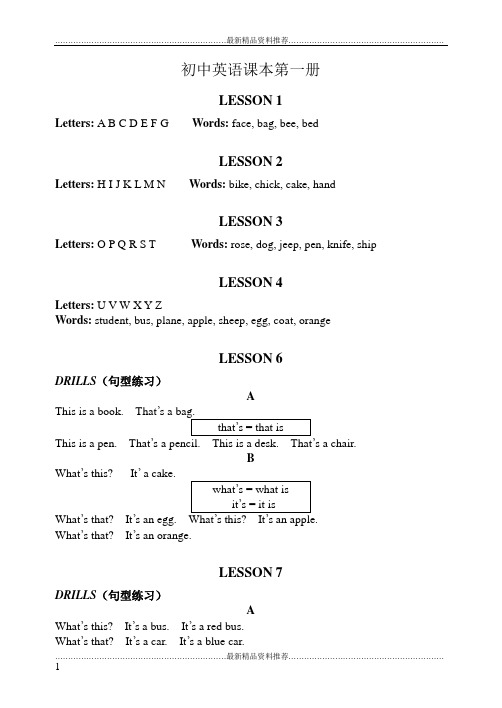
初中英语课本第一册LESSON 1Letters: A B C D E F G Words: face, bag, bee, bedLESSON 2Letters: H I J K L M N Words: bike, chick, cake, handLESSON 3Letters: O P Q R S T Words: rose, dog, jeep, pen, knife, shipLESSON 4Letters: U V W X Y ZWords: student, bus, plane, apple, sheep, egg, coat, orangeLESSON 6DRILLS(句型练习)AThis is a book. That’This is a pen. That’s a chair.BWhat’s this? It’ a cake.What’s that? It’s an egg.What’s that? It’s an orange.LESSON 7DRILLS(句型练习)AWhat’s this? It’s a bus. It’s a red bus.What’s that? It’s a car. It’s a blue car.BIs this a jeep? Yes, it is. Is it green? Yes, it is.CIs this a ship? Yes, it is. What colour is it? It’s yellow.Is that a plane? Yes, it is. What colour is it? It’s white.DIALOGUE(对话)A:What colour is this apple?B:It’s red.A:What colour is that banana?B:It’s yellow.A:What colour is an orange?B:Why, it’s orange. An orange is orangeLESSON 8DRILLS(句型练习)AThis is my cup. It isn’t your cup. My cup is white. Your cup is yellow. That isn’t his bike. It’Her bike is green.Is this your desk? Yes, it is. Is that your chair? No, it isn’t. It’s his chair. Is this your rubber? Yes, it is. Is that your ruler? No, it isn’t. It’s her ruler. DIALOGUE(对话)Tom:Kate!Kate:Yes?Tom:Is this your knife?Kate:No, it isn’t.* * *Kate:Tom! Is this your pencil-box?Tom:Yes, it is. Thank you.Kate:That’s all right.LESSON 9DRILLS(句型练习)Aone ship; two ships; three cakes; four coats; five beds;six bees; seven bananas; eight oranges; nine buses; ten boxes;BThese are apples. Those aren’t apples. They’re oranges.The apples are here.These are desks.The desks are here. The tables are there.DIALOGUE(对话)A:Look,what’s this?B:It’s a ship.A:No,it’s a sheep. These are all sheep. They’re white sheep. What are those? B:Why, they’re sheep, too. They’re black sheep.A:No, they aren’t sheep. They’re goats.GRAMMAR(语法)名词的复数形式(The Plural Number of Nouns)(Ⅰ)1、一般在单数名词末尾加-s:book-----books ruler-----rulers egg-----eggs student-----students hand-----hands rose-----roses orange-----oranges2、以s、x等结尾的词加-es:bus-----buses box-----boxes注:knife的复数形式为knives,sheep的复数形式和单数形式相同。
八年级英语上学期unit1-lesson1
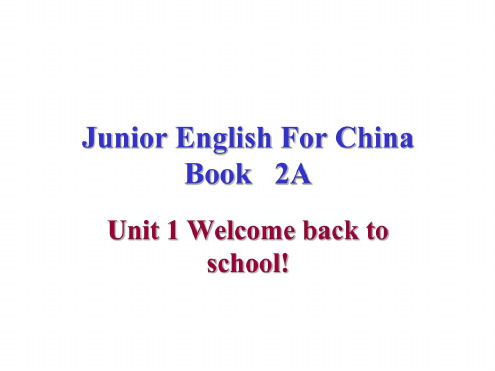
中国外语教育发展史回顾
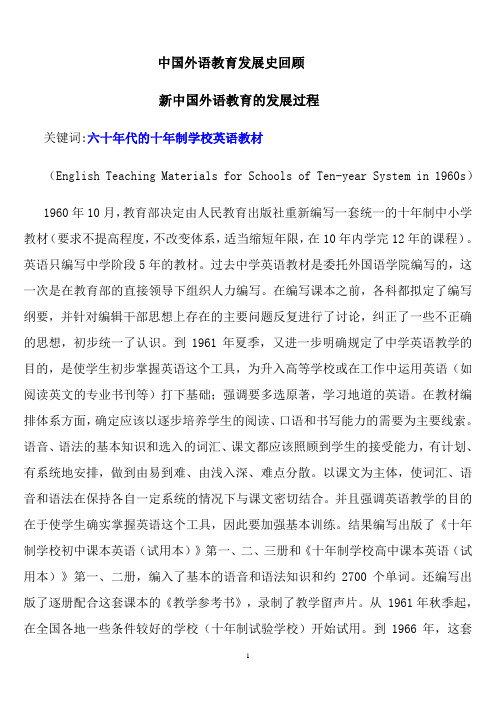
中国外语教育发展史回顾新中国外语教育的发展过程关键词:六十年代的十年制学校英语教材(English Teaching Materials for Schools of Ten-year System in 1960s)1960年10月,教育部决定由人民教育出版社重新编写一套统一的十年制中小学教材(要求不提高程度,不改变体系,适当缩短年限,在10年内学完12年的课程)。
英语只编写中学阶段5年的教材。
过去中学英语教材是委托外国语学院编写的,这一次是在教育部的直接领导下组织人力编写。
在编写课本之前,各科都拟定了编写纲要,并针对编辑干部思想上存在的主要问题反复进行了讨论,纠正了一些不正确的思想,初步统一了认识。
到1961年夏季,又进一步明确规定了中学英语教学的目的,是使学生初步掌握英语这个工具,为升入高等学校或在工作中运用英语(如阅读英文的专业书刊等)打下基础;强调要多选原著,学习地道的英语。
在教材编排体系方面,确定应该以逐步培养学生的阅读、口语和书写能力的需要为主要线索。
语音、语法的基本知识和选入的词汇、课文都应该照顾到学生的接受能力,有计划、有系统地安排,做到由易到难、由浅入深、难点分散。
以课文为主体,使词汇、语音和语法在保持各自一定系统的情况下与课文密切结合。
并且强调英语教学的目的在于使学生确实掌握英语这个工具,因此要加强基本训练。
结果编写出版了《十年制学校初中课本英语(试用本)》第一、二、三册和《十年制学校高中课本英语(试用本)》第一、二册,编入了基本的语音和语法知识和约2700个单词。
还编写出版了逐册配合这套课本的《教学参考书》,录制了教学留声片。
从 1961年秋季起,在全国各地一些条件较好的学校(十年制试验学校)开始试用。
到1966年,这套教材刚好用完一轮。
文化大革命开始,这套教材被贬为“封、资、修的大杂烩”,停止使用。
这套课本是建国以来第二套中学英语通用教材。
它克服了过去强调政治内容、不注意学语言的偏向,重视了培养学生运用英语的能力。
人教版英语八年级上册Unit1 SectionB1a-1e课件
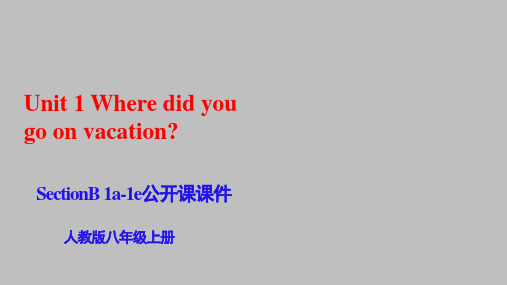
How were the stores there? They were......
昂贵的
expensive [ɪkˈspensɪv]
便宜的
cheap [tʃi:p]
How were the people there? They were......
同kind,常用词组be friendly to sb。
G: And __h_o_w__w_e_r_e_t_h_e_p__eo_p__le_?Were they friendly?
L: Yeah, they were really friendly. My parents have
some friends there, and we had dinner at their
3. Did she buy anything for her best friend?
_Y_e_s_,_s_h_e_d_i_d_.________________________
4. Did Lisa like her vacation? __Y_e_s_,_s_h_e_d_i_d_.________
exciting
interesting
lovely
good great
beautiful
....
friendly delicious
boring
bored
rainy hot
unfriendly
bad
...
terrible
1b Match the words with the pictures below.
delicious; expensive; exciting ; cheap; terrible ; boring...
人教版八年级初二英语上册高清全版电子教科书

人教版八年级初二英语上册高清全版电子教科书第一单元:人物介绍1.1 课文内容本单元主要介绍了四个人的职业、爱好和外貌特征。
通过阅读,学生可以提高听力、口语和阅读理解能力。
1.2 重点词汇- doctor:医生- engineer:工程师- farmer:农民- teacher:老师- like:喜欢- listen to music:听音乐- play basketball:打篮球- watch movies:看电影- read books:读书- wear glasses:戴眼镜1.3 语法点本单元主要介绍了现在进行时。
现在进行时表示正在进行的动作或存在的状态。
第二单元:家庭成员2.1 课文内容本单元主要介绍了家庭成员的名称和相互关系。
通过阅读,学生可以提高听力、口语和阅读理解能力。
2.2 重点词汇- mother:母亲- father:父亲- sister:姐妹- brother:兄弟- grandmother:祖母- grandfather:祖父- family:家庭2.3 语法点本单元主要介绍了疑问词 who 的用法。
疑问词 who 用于询问人物身份或名称。
第三单元:数字和颜色3.1 课文内容本单元主要介绍了数字和颜色的英文表达。
通过阅读,学生可以提高听力、口语和阅读理解能力。
3.2 重点词汇- one:一- two:二- three:三- four:四- five:五- six:六- seven:七- eight:八- nine:九- ten:十- red:红色- yellow:黄色- blue:蓝色- green:绿色- black:黑色- white:白色3.3 语法点本单元主要介绍了数字和颜色的英文表达。
第四单元:动物和植物4.1 课文内容本单元主要介绍了动物和植物的名称及特点。
通过阅读,学生可以提高听力、口语和阅读理解能力。
4.2 重点词汇- cat:猫- dog:狗- fish:鱼- bird:鸟- elephant:大象- tiger:老虎- lion:狮子- bear:熊- plant:植物- tree:树- flower:花4.3 语法点本单元主要介绍了动物和植物的英文表达。
70后初中英语课本第一册(免费版)

初中英语课本第一册LESSON 1Letters: A B C D E F G W ords: face, bag, bee, bed LESSON 2Letters: H I J K L M N W ords: bike, chick, cake, hand LESSON 3Letters: O P Q R S T W ords: rose, dog, jeep, pen, knife, ship LESSON 4Letters: U V W X Y ZW ords: student, bus, plane, apple, sheep, egg, coat, orange LESSON 6DRILLS (句型练习)AThis is a book. That ’This is a pen. That ’s a chair.BWhat ’s this? It ’ a cake.What ’s that? It ’s an egg. What ’s that? It ’s an orange. LESSON 7DRILLS (句型练习)AWhat ’s this? It ’s a bus. It ’s a red bus.What ’s that? It ’s a car. It ’s a blue car.BIs this a jeep? Y es, it is. Is it green? Y es, it is.CIs this a ship? Y es, it is. What colour is it? It ’s yellow.Is that a plane? Yes, it is. What colour is it? It ’s white. DIALOGUE (对话)A :What colour is this apple?B :It ’s red.A :What colour is that banana?B :It ’s yellow.A :What colour is an orange?B :Why , it’s orange. An orange is orangeLESSON 8DRILLS (句型练习)AThis is my cup.It isn’t your cup.My cup is white.Y our cup is yellow.That isn’t his bike. It ’Her bike is green.Is this your desk?Yes, it is. Is that your chair?No, it isn’t. It ’s his chair. Is this your rubber? Y es, it is. Is that your ruler? No, it isn’t. It ’s her ruler.DIALOGUE (对话)Tom :Kate!Kate :Y es?Tom :Is this your knife?Kate :No, it isn’t.* * *Kate :Tom! Is this your pencil-box?Tom :Y es, it is. Thank you.Kate :That ’s all right.LESSON 9DRILLS (句型练习)Aone ship; two ships; three cakes; four coats; five beds;six bees; seven bananas; eight oranges; nine buses; ten boxes; BThese are apples. Those aren’t apples. They ’re oranges.The apples are here.These are desks. The desks are here. The tables are there. DIALOGUE (对话)A :Look ,what ’s this?B :It ’s a ship.A :No ,it ’s a sheep. These are all sheep. They’re white sheep. What are those?B :Why , they’re sheep, too. They ’re black sheep.A :No, they aren’t sheep. They ’re goats.GRAMMAR (语法)名词的复数形式(The Plural Number of Nouns)(Ⅰ)1、一般在单数名词末尾加-s :book-----books ruler-----rulers egg-----eggs student-----students hand-----hands rose-----roses orange-----oranges2、以s 、x 等结尾的词加-es :bus-----buses box-----boxes注:knife 的复数形式为knives ,sheep 的复数形式和单数形式相同。
初中英语课本第二册(1982年版)

初中英语课本第二册LESSON 3DRILLS(句型练习)AWhat’s in the room? There’s a table.Are there any bowls on the table? Yes, there are.And there are some plates, too.BWhat’s on the two plates? There’s some fish on one plate.There’s some bread on the other.What’s in the bowls? There’s some meat in this one.There isn’t any meat in that one. There’s some rice in it.CWhat’s in those glasses? There’s some water in them.Please pass me a glass of water. Here you are.What’s in these cups? There’s some tea in them.Please give him a cup of tea. All right.DAre there any cups on the table? Yes, there are.Is there any tea in that blue cup? Yes, there is.Is there any tea in that green one? No, there isn’t. There’s some milk in it. DIALOGUE(对话)SUPPER IS READYMum: Lingling!Ling: Yes, Mum?Mum: Supper is ready.Ling: All right.Dad: Hurry!Ling: I’m coming. Hello, Dad. Hello, Mum.Mum: Sit down. Lingling. Here’s your rice.Ling: Thanks. Oh, there’s fish and chicken! Meat too!And eggs!Why so much, Mum?Mum: It’s your daddy’s birthday.Ling: Oh! Happy birthday, Dad!Dad: Thank you, Lingling. Help yourself to some fish.Ling: Thank you.GRAMMAR(语法)可数和不可数名词(Countable and Uncontable Nouns),英语名词分可数名词和不可数名词两类。
初中第一册
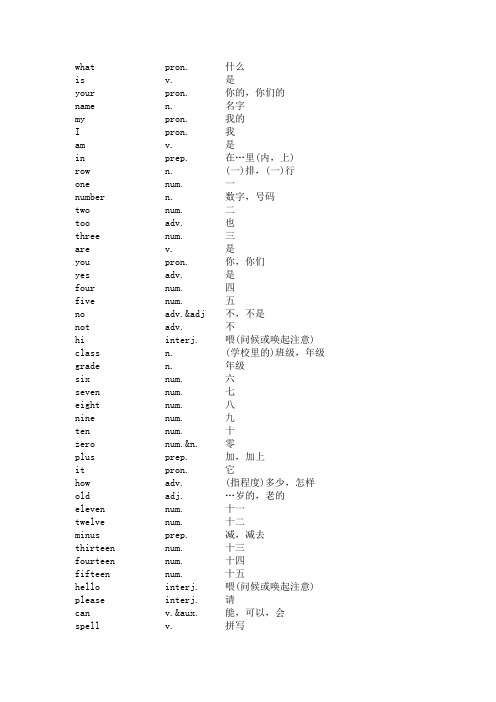
what pron. 什么is v. 是your pron. 你的,你们的name n. 名字my pron. 我的I pron. 我am v. 是in prep. 在…里(内,上)row n. (一)排,(一)行one num. 一number n. 数字,号码two num. 二too adv. 也three num. 三are v. 是you pron. 你,你们yes adv. 是four num. 四five num. 五no adv.&adj 不,不是not adv. 不hi interj. 喂(问候或唤起注意) class n. (学校里的)班级,年级grade n. 年级six num. 六seven num. 七eight num. 八nine num. 九ten num. 十zero num.&n. 零plus prep. 加,加上it pron. 它how adv. (指程度)多少,怎样old adj. …岁的,老的eleven num. 十一twelve num. 十二minus prep. 减,减去thirteen num. 十三fourteen num. 十四fifteen num. 十五hello interj. 喂(问候或唤起注意) please interj. 请can v.&aux. 能,可以,会spell v. 拼写that pron. 那,那个secret n. 秘密this pron. 这,这个in prep. 用…(表达)English n. 英语,英国人adj. 英国的,英国人的a art. 一(个,件…)clock n. 钟and conj. 和,又,而pencil-box n. 铅笔盒an art. 一(个、件)(用于元音开头的词前) pencil n. 铅笔ruler n. 尺子pen n. 钢笔sharpener n. 卷笔刀eraser n. 橡皮擦room n. 房间book n. 书map n. 地图desk n. 书桌cup n. 杯子bag n. 书包computer n. 电脑,电子计算机mouse n. 鼠,耗子,鼠标bed n. 床keyboard n. 键盘pear n. 梨cake n. 蛋糕,饼,糕banana n. 香蕉apple n. 苹果orange n. 橙子,橘子egg n. 蛋bike n. 自行车bus n. 公共汽车car n. 汽车,小汽车jeep n. 吉普车Chinese adj. 中国的,中国人的n. 中国人,汉语Japanese adj. 日本的,日本人的n. 日本人,日语look v. 瞧,看who pron. 谁she pron. 她he pron. 他its pron. 它的do v.&aux. (构成否定句,疑问句的助动词) know v. 知道,懂得think v. 想,认为Mr(mister) n. 先生(用于姓名前)very adv. 很,非常picture n. 图画,照片Mrs n. 夫人boy n. 男孩girl n. 女孩woman n. 妇女,女人man n. 男人,人cat n. 猫his pron. 他的teacher n. 教师her pron. 她的everyone pron. 每人,人人here adv. 这里,这儿today adv.&n. 今天at prep. 在school n. 学校sorry adj. 对不起,抱歉的where adv. 在哪里home n. 家fine adj. (身体)好的thanks n. 谢谢OK adv. 好,对,不错,可以thank v. 谢谢goodbye interj. 再见,再会bye interj. 再见parrot n. 鹦鹉sister n. 姐,妹father n. 父亲mother n. 母亲box n. 盒子,箱子excuse v. 原谅me pron. 我but conj. 但是these pron. 这些they pron. 他(她,它)们good adj. 好的those pron. 那些boat n. 船tree n. 树their pron. 他们(她们,它们)的much adv. 多,很,非常all adv. 都,完全right adj.&adv. 对的(地),正确的(地)mum n. (口语)妈妈friend n. 朋友brother n. 兄,弟nice adj. 令人愉快的to prep. (表示方向)到,向,动词不定式符号meet v. 见面,会面,遇见child n. 小孩welcome v. 欢迎our pron. 我们的come v. 来morning n. 早晨,上午class n. 同一个班的学生on prep. 在,在…上duty n. 职责,责任we pron. 我们have v. 有new adj. 新的student n. 学生twin n. 双胞胎之一look v. 看上去,显得the art. 这(那)个,这(那)些same adj. 同样的,同一的American n. 美国人adj. 美国人的sit v. 坐down adv. 向下over adv. 在那边,在另一边there adv. 那里,那儿after prep. 在…以后,在…后面Miss n. 女士,小姐(对未婚妇女的称呼) way n. 路,道路put v. 放coat n. 外套,上衣them pron. 他(她,它)们washroom n. 盥洗室,厕所let v. 让us pron. 我们go v. 去classmate n. 同班同学nice adj. 好的,漂亮的love v. 爱,喜爱middle adj. 中间的,中级的middle school n. 中学well interj. 喔,那么,好吧fax n. 传真phone n. 电话,电话机ID n. 身份证policeman n. 警察ask v. 问sir n. (用于尊称)先生,阁下yes adv. (用于疑问,征询等)什么,是吗licence n. 执照,许可证dear interj. (表示惊讶等)哎呀see v. 看见,看到will v.&aux. 将,会,要take v. 拿到,带到address n. 地址age n. 年龄glad adj. 高兴的,乐意的why interj. (表示惊讶、不耐烦、恼怒等)嗨now adv. 现在China n. 中国or conj. 或者,还是work v.&n. 工作family n. 家,家庭family tree n. 家谱grandmother n. (外)祖母grandma n. (口语)奶奶,外婆grandfather n. (外)祖父grandpa n. (口语)爷爷,外公dad n. (口语)爸爸,爹爹wife n. 妻子husband n. 丈夫daughter n. 女儿son n. 儿子parent n. 父(母)亲parents n. 父母亲,双亲big adj. 大的England n. 英格兰aunt n. 姨母,舅母,姑母,伯母,婶母uncle n. 叔,伯,舅,姨父,姑父afternoon n. 下午,午后do v. 做,干,行动seat n. 座位like prep. 像,跟…一样hat n. 帽子(一般指有边的帽子) doctor n. 医生worker n. 工人guess v. 猜behind prep. 在…后面chair n. 椅子ball n. 球under prep. 在…下面floor n. (室内)地,地板photo n. 照片wall n. 墙shoe n. 鞋near prep. 在…附近door n. 门of prep. …的classroom n. 教室answer v. 回答blackboard n. 黑板some pron. 一些,若干schoolbag n. 书包flower n. 花find v. 找到,发现broom n. 扫帚window n. 窗raincoat n. 雨衣cap n. 便帽,军帽football n. 足球table n. 桌子Hong Kong n. 香港Macao n. 澳门SAR n. 特别行政区there pron. 表示存在,有…,作引导词lock v.&n. 锁many adj. 许多的,多的thing n. 东西,事情must v.&aux. 必须,应当open v. 打开get v. 得到,获得help v. 帮助purse n. 钱包money n. 钱,货币worry v. (使)担忧fifty num. 五十colour n. 颜色black adj. 黑色的house n. 房子small adj. 小的playhouse n. 儿童游戏房like v. 喜欢play v. 玩,打(球)up adv. 在上面,在高处,向上,起来with prep. 和great adv. (口语)好极了,很好look n. 瞧,看ping-pong n. 乒乓球kite n. 风筝young adj. 年轻的,幼小的pioneer n. 先锋Young Pioneer n. 少先队员only adv. 仅仅,只work n. 工作sky n. 天空count v. 数,点数river n. 江,河dog n. 狗light n. 灯any adj. (用于否定句,疑问句等)什么,任何animal n. 动物people n. 人,人们little adj.&adv. 小的,一点儿,稍许sheep n. 绵羊red n. 红色adj. 红色的yellow n. 黄色adj. 黄色的blue n. 蓝色adj. 蓝色的white n. 白色adj. 白色的green n. 绿色adj. 绿色的purple n. 紫色adj. 紫色的brown n. 棕色,褐色adj. 棕色的,褐色的orange n. 橙色adj. 橙色的grey n. 灰色,灰白adj. 灰色的,灰白的colour v. 给…着色sweater n. 毛衣,厚运动衫light adj. 淡(浅)色的,轻的want v. 要,想要which pron.&adj. 哪一个,哪些one pron. 用来代替单数的人或物clothes n. 衣服line n. 线,绳索whose pron. 谁的blouse n. 女衬衫dress n. 女服,(统称)衣服shirt n. (男式)衬衫trousers n. 裤子skirt n. 女裙dark adj. 深(浓)色的,黑暗的yours pron. 你的,你们的mine pron. 我的hers pron. 她的theirs pron. 他们(她们,它们)的ours pron. 我们的glove n. 手套about prep. 关于,对于beside prep. 在…旁边watch n. 手表v. 观看,注视give v. 给time n. 时间about adv. 大约thirty num. 三十late adj. 迟的,晚的adv. 迟地,晚地midnight n. 午夜noon n. 中午,正午past prep. (超)过,经过half n. 半,一半quarter n. 一刻钟,四分之一for prep. 为,给break n. (课间)休息,中断lunch n. 午餐breakfast n. 早餐clean v. 把…弄干净,擦干净supper n. 晚餐TV n. 电视,电视机game n. 游戏,运动p.m. n. 下午,午后London n. 伦敦Tokyo n. 东京Sydney n. 悉尼hour n. 小时a.m. n. 午前,上午hundred num. 百yourself pron. 你自己bedroom n. 卧室doll n. 玩具娃娃else adv.&adj. 别(的),其他(的)sure adv. 的确,一定adj. 确信的,肯定的between prep. 在(两者)之间tall adj. 高的funny adj. 滑稽的,有趣的favourite adj. 特别喜爱的e-mail n. 电子邮件speak v. 讲,说next adj. 下一个term n. 学期could v.&aux. (表示许可或请求)可以,行minute n. 分钟,一会儿Tuesday n. 星期二February n. 二月eighteenth num. 第十八listen v. 听careful adj. 小心的,仔细的carefully adv. 小心地,仔细地draw v. 画,绘制face n. 脸,面孔eye n. 眼睛ear n. 耳朵leg n. 腿hand n. 手long adj. 长的short adj. 短的,矮的mouth n. 嘴say v. 说,讲tick n. (钟表等滴嗒的)声音heavy adj. 重的empty adj. 空的certainly adv. 当然full adj. 满的carry v. 携带,搬运,运送too adv. 太so adv. 这么,那么tape n. 磁带there interj. 好啦(表示安慰)all adj. 整个,所有的basket n. 篮子bottle n. 瓶juice n. (水果、蔬菜、肉等的)汁,水汁head n. 头,头部nose n. 鼻子hair n. 头发arm n. 手臂,胳膊foot n. 脚wardrobe n. 衣柜day n. 日,天from prep. 从…起America n. 美国zoo n. 动物园away adv. 离开out adv. 在外sock n. 短袜other adj. 别的,其他的wrong adj. 不正确的,错误的broken adj. 弄坏了的so pron. 这样,如此catch v. 捉,抓住him pron. 他right adv. 正好,恰好,正确goodness n. 善良,美德plane n. 飞机with prep. 对…关于mend v. 修补,修理knife n. 小刀robot n. 机器人body n. 身体lost adj. 丢失的,丢去的tell v. 告诉,讲述round adj. 球形的,圆的mummy n. (口语)妈妈pleasure n. 愉快,高兴food n. 食物drink n. 饮料v. 喝hungry adj. 饥饿的thirsty adj. 口渴的water n. 水v. 浇水eat v. 吃rice n. 米饭,大米bread n. 面包meat n. 肉tea n. 茶milk n. 牛奶glass n. 玻璃杯something pron. 某事(物),某东西porridge n. 粥,稀饭fish n. 鱼dumpling n. 饺子fruit n. 水果piece n. 一张(片、张)hamburger n. 汉堡包noodle n. 面条potato n. 马铃薯,土豆chips n. 炸士豆儿条coke n. 可口可乐coffee n. 咖啡madam n. 夫人,女士dear adj. 亲爱的,可爱的ice n. 冰cream n. 奶油,乳脂ice cream n. 冰淇淋USA n. 美国different adj. 不同的vegetable n. 蔬菜sometimes adv. 有时sport n. 运动ouch interj. (突然感到病痛时发出的声音)啊呀basketball n. 蓝球easy adj. 容易的pass v. 传递try v. 试(做),设法,努力yo-yo n. 溜溜球go n. 尝试(做某事)throw v. 投,掷hard adj. 困难的ride v. 骑(自行车,马等) swim v. 游泳skate v. 滑冰,溜冰fly v. 放(风筝,飞机模型等) card n. 纸牌,卡片volleyball n. 排球jump v. 跳sing v. 唱,唱歌run v. 跑high adj. 高的adv. 高地then adv. 那么,然后question n. 问题postal adj. 邮政的code n. 密码,符号ski v. 滑雪tennis n. 网球(运动)table tennis n. 乒乓球roller-skating n. 滑旱冰chess n. 国际象棋fan n. (电影,运动等的)迷player n. 比赛者,选手team n. 队,组every adj. 每一,每个的Friday n. 星期五make v. 做,制作homework n. 家庭作业read n. 读,阅读write v. 写sleep v. 睡,睡觉cook v. 烹调,煮,烧n. 炊事员,厨师talk v. 说话,谈话open n. 打开close v. 关,闭wear v. 穿Sunday n. 星期日park n. 公园toy n. 玩具,玩物lake n. 湖clear adj. 清晰的,清楚的,明亮的shop n. 商店day n. 日,一天Friday n. 星期五early adj. 早的adv. 早地,初期supermarket n. 超级市场Wednesday n. 星期三may v.&aux. 可以,可能,也许borrow v. 借from prep. 从,从…起Thursday n. 星期四week n. 周,星期Monday n. 星期一Saturday n. 星期六Sunday n. 星期日hey interj. 嘿,喂dictionary n. 字典,词典back adv. 回(原处),向后tomorrow n. 明天adv. 在明天CD n. 激光唱片lot n. 许多evening n. 傍晚,晚上model n. 模型,模范,样式park n. 公园rest n. 休息maths n. (英式拼法)数学math n. (美式拼法)数学all adv. 全体,全部hard adv. 努力fun adj. 有趣的,愉快的yeah adv. (口语)是的,嗯take v. 花费(时间) straight adj. 直的use v. 用,使用,应用wheel n. 轮,机轮into prep. 到…里,向内music n. 音乐,乐曲boat v. 划船lake n. 湖worried adj. 担心的,烦恼的save v. 救,挽救,节省ticket n. 票,券New York n. 纽约meeting n. 会,会议bring v. 带来,拿来foreign adj. 外国的difference n. 不同,差异each adv.&pron. 各自,各个each other pron. 互相USA n. 美国Australia n. 澳大利亚Canada n. 加拿大UK n. 联合王国Japan n. 日本America n. 美国French n. 法语great adj. 伟大的,很大的,重要的the Great Wall n. 长城hotel n. 旅馆,饭馆building n. 建筑物follow v. 跟随call v. 称呼,叫喊,打电话给 n. 电话,通话family name n. 姓first num.&adv. 第一,首先,最初postcard n. 明信片teach v. 教,教书dinner n. 正餐,晚餐soon adv. 不久,一会儿stay v. 停留(在某处)high school n. 中学Toronto n. 多伦多(加拿大港市) schoolboy n. (中小学的)男学生country n. 国家France n. 法国textbook n. 课本Englishman n. 英国(男)人Australian adj. 澳大利亚人Canadian n. 加拿大人city n. 城市foreigner n. 外国人visit v. 访问,参观,拜访word n. 词,单词well adv. 好why adv. 为什么English-speaking adj. 说英语的letter n. 信hot adj. 热的,辣的hot dog n. 热狗(红肠面包) different adj. 不同的kind n. 种,类every adj. 每一的,每个的meal n. 一餐,一顿饭noodle n. 面条vegetable n. 蔬菜restaurant n. 饭馆often adv. 常常potato n. 马铃薯,土豆well adj. 好的,(身体)健康的 adv. 好地,(身体)健康地why adv. 为什么because conj. 因为housework n. 家务劳动machine n. 机器again adv. 又,再wash v. 洗,漱洗dish n. 一道菜,盘,碟electronic adj. 电子的mail n. 邮政,邮递smoke v. 吸烟n. 烟fog n. 雾smog n. 烟雾dance v. 跳舞living room n. 起居室dining room n. 餐厅driver n. 司机,驾驶员farmer n. 农民soldier n. 士兵,战士businessman n. 商人assistant n. 助手,助理a shop assistant n. 售货员,店员nurse n. 护士postman n. 邮递员factory n. 工厂station n. 车站,所,站bus station n. 公共汽车站hospital n. 医院farm n. 农场post n. 邮政,邮寄,邮件office n. 办公室post office n. 邮局study v. 学习,研究party n. 聚会friendly adj. 友好的also adv. 也medicine n. 内服药,医学weekend n. 周末job n. 工作writer n. 作家,作者cleaner n. 清洁工turn n. (依次轮流的)顺序,轮流grow v. 种植,生长baker n. 面包师artist n. 画家,艺术家hobby n. 业余爱好place n. 地点,地方weekday n. 工作日,平日(除星期六,星期日) when adv. 什么时候,何时leave v. 离去,出发begin v. 开始,着手usually adv. 通常sometimes adv. 有时exercise n. 锻炼,做操,练习shopping n. 买东西garden n. 花(果,菜)园be v. 是,成为over adv. 结束,完了living-room n. 起居室playground n. (学校的)操场walk v. 走,步行,散步news n. 新闻,消息match n. 比赛,竞赛quickly adv. 迅速sun n. 太阳moon n. 月亮bridge n. 桥train n. 火车ship n. 船,轮船holiday n. 假日,假期year n. 年by prep. 乘车(船等)air n. 天空,空气sea n. 海,海洋walk v. 走,步行,散步clean adj. 干净的,清洁的story n. 故事far adj. 远的adv. 远地problem n. 问题,难题earlier adj. 更早的adv. 更早地ill adj. 病的,不健康的tear n. 眼泪,泪珠chicken n. 鸡,鸡肉tofu n. 豆腐fridge n. 电冰箱list n. 清单,一览表,名单,目录shopping list n. 购物清单buy v. 买kilo n. 千克,公斤sell v. 卖,售cheap adj. 便宜的expensive adj. 昂贵的tomato n. 西红柿,蕃茄onion n. 洋葱carrot n. 胡萝卜pork n. 猪肉open adj. 开着的market n. 市场,集市dollar n. 元(美,加拿大等国的货币单位) cent n. (货币)分pound n. 镑(重量单位)health n. 健康,卫生fast adj. 快的,迅速的adv. 快地,迅速地travel v.&n. 旅行safe adj. 安全的,平安的minibus n. 小型公共汽车price n. 价格,价钱example n. 例子,榜样stand v. 站,立field n. 地,田地job n. 工作bright adj. 明亮的,灿烂的foreign adj. 外国的sunglasses n. 太阳镜each pron. 各自,各个helpful adj. 有帮助的,有益的business n. 商业,生意,事物company n. 公司manager n. 经理,负责人century n. 世纪,百年in English 用英语(表达)at school 在学校at home 在家how are you? 你(身体)好吗?here you are. 给你very much 很,非常all right 好,行,不错come in 进来,进入on duty 值日look the same 看起来很像sit down 坐下over there 在那边look after 照顾,照看this way, please. 请走这边let's go. 我们一起去look at 看,观看how do you do? 你好!have a seat 坐下,就坐look like 看起来像let me see. 让我想想have a look 看一看how many 多少at work 在工作come on 来吧,跟着来,赶快what about…? (询问消息,征求意见)…怎么样? get up 起床o'clock …点钟have supper 吃晚餐watch TV 看电视go home 回家put on 穿上(衣服等),戴上(帽子等)a glass of 一(玻璃)杯would like 想要a piece of 一片(一张、块)come on 来,过来be good at 在…方面(学得,做得)好,善于make the bed 整理床铺do homework 做作业talk with 和…交谈talk photos 照像a lot 非常give…a hand 给予…帮助from…to…从…到…after class 课后help…with 帮助(某人)做(某事)have a(good)rest 休息learn…from 向…学习talk about 谈论,交谈a little 一点,少量make friends 交朋友not…at all 一点也不a kind of 一种,一类make phone calls 打电话in the day 在白天at night 在晚上,在夜里make money 赚钱have sports 进行体育活动go to bed 睡觉right now 立刻,马上take off 脱衣服after school 放学后,下课后get to 到达do morning exercises 做早操go shopping (去)买东西do (some) reading 朗读,阅读on foot 走路,步行by plane 乘飞机by ship 乘船by air 乘飞机by sea 乘船take time 花费(时间)how long 多久how much 多少,多少钱all day 一整天,一天到晚a lot of 许多,很多of course 当然,自然的事for example 例如one day (过去或将来)有一天,某一天get on (a bus) 上车and so on 等等get down 下来,落下put away 把…什么收起来(放好) a bottle of 一瓶…listen to 听be full (of) 充满…的。
- 1、下载文档前请自行甄别文档内容的完整性,平台不提供额外的编辑、内容补充、找答案等附加服务。
- 2、"仅部分预览"的文档,不可在线预览部分如存在完整性等问题,可反馈申请退款(可完整预览的文档不适用该条件!)。
- 3、如文档侵犯您的权益,请联系客服反馈,我们会尽快为您处理(人工客服工作时间:9:00-18:30)。
初中英语课本第一册LESSON 1Letters: A B C D E F G Words: face, bag, bee, bedLESSON 2Letters: H I J K L M N Words: bike, chick, cake, handLESSON 3Letters: O P Q R S T Words: rose, dog, jeep, pen, knife, shipLESSON 4Letters: U V W X Y ZWords: student, bus, plane, apple, sheep, egg, coat, orangeLESSON 6DRILLS(句型练习)AThis is a book. That’s a bag.that’s = that isThis is a pen. That’s a pencil. This is a desk. That’s a chair.BWhat’s this? It’ a cake.what’s = what isit’s = it isWhat’s that? It’s an egg. What’s this? It’s an apple.What’s that? It’s an orange.LESSON 7DRILLS(句型练习)AWhat’s this? It’s a bus. It’s a red bus.What’s that? It’s a car. It’s a blue car.BIs this a jeep? Yes, it is. Is it green? Yes, it is.CIs this a ship? Yes, it is. What colour is it? It’s yellow.Is that a plane? Yes, it is. What colour is it? It’s white.DIALOGUE(对话)A:What colour is this apple?B:It’s red.A:What colour is that banana?B:It’s yellow.A:What colour is an orange?B:Why, it’s orange. An orange is orangeLESSON 8DRILLS(句型练习)AThis is my cup. It isn’t your cup. My cup is white. Your cup is yellow. That isn’t his bike. It’s her bike. His bike is black. Her bike is green.isn’t = is notBIs this your desk? Yes, it is. Is that your chair? No, it isn’t. It’s his chair. Is this your rubber? Yes, it is. Is that your ruler? No, it isn’t. It’s her ruler. DIALOGUE(对话)Tom:Kate!Kate:Yes?Tom:Is this your knife?Kate:No, it isn’t.* * *Kate:Tom! Is this your pencil-box?Tom:Yes, it is. Thank you.Kate:That’s all right.LESSON 9DRILLS(句型练习)Aone ship; two ships; three cakes; four coats; five beds;six bees; seven bananas; eight oranges; nine buses; ten boxes;BThese are apples. Those aren’t apples. They’re oranges.The apples are here. The oranges are there.aren’t = are notthey’re = they areThese are desks. Those aren’t desks. They’re tables.The desks are here. The tables are there.DIALOGUE(对话)A:Look,what’s this?B:It’s a ship.A:No,it’s a sheep. These are all sheep. They’re white sheep. What are those? B:Why, they’re sheep, too. They’re black sheep.A:No, they aren’t sheep. They’re goats.GRAMMAR(语法)名词的复数形式(The Plural Number of Nouns)(Ⅰ)1、一般在单数名词末尾加-s:book-----books ruler-----rulers egg-----eggs student-----students hand-----hands rose-----roses orange-----oranges2、以s、x等结尾的词加-es:bus-----buses box-----boxes注:knife的复数形式为knives,sheep的复数形式和单数形式相同。
LESSON 10DRILLS(句型练习)AWhat are these? They’re pigs. They’re fat.What are those? They’re goats. They’re thin.BAre these horses white? Yes, they are.Are those cows white,too? No, they aren’t. They’re black and white.CAre those chicks? No, they aren’t. Are they cocks? No, they aren’t.What are they, then? They’re hens. They are big, fat hens.DIALOGUE(对话)Kate:What’s in that box, Mum?Mum:Shoes. New shoes for you.Kate:New shoes for me! What colour are they?Mum:Guess.Kate:Are they white?Mum:No, they aren’t.Kate:Are they red?Mum:No.Kate:Are they green, then?Mum:No. Look, they’re blue.Kate:How nice! Thank you, Mum.LESSON 11DRILLS(句型练习)AThis is Kate and this is Joan. Kate’s hair is long. Joan’s hair is short.This is Mike and this is Tom. Tom’s trousers are new. Mike’s trousers are old..BIs Kate’s hair long or short? It’s long.Are Tom’s trousers old or new? They’re new.CWhose room is this? It’s our room. It’s small.Whose books are those? They’re their books. They’re new.DIALOGUE(对话)Kate: Hello, Joan.Joan: Hello, Kate.Kate: Joan, this is Mike. He’s a new student.Joan: Hello, Mike.Mike: Hello, Joan.Mike: Whose seat is this?Kate: It’s Joan’s. Your seat is over there.He’s = he isLESSON 13DRILLS(句型练习)Li Ping is a boy. He’s a Chinese boy. He’s twelve. He’s tall. He’s a student.Li Ying is a girl. She’s Li Ping’s sister. She’s five. She’s short. She isn’t a student.she’s = she isBWho’s this man? He’s Li Ping’s father. Is he a teacher? Yes, he is.who’s = who isWho’s this woman? She’s Li Ping’s mother. Is she a teacher, too? No, she isn’t. She’s a worker.CThese two boys are Jack and Mike. They aren’t Chinese.They’re English. They’re brothers.DWho are these girls? They’re Joan and Kate.Are they English? Yes, they are.Are they sisters? No, they aren’t. They’re friends.DIALOGUE(对话)A: Look at this picture, Li Ping.B: Oh, it’s an old picture. Who’s this man?A: He’s my father.B: Oh, your father?A: Yes. He’s a teacher. And this is my mother.B: Is she a teacher, too?A: No. she’s a worker.B: Who’s this baby?A: Guess!B: Is it your brother?A: No.B: Your sister?A: No.B: Then it’s you! Ha ha!A: Yes, it’s me.LESSON 14DRILLS(句型练习)I’m a boy. You’re a girl. She’s a girl. You’re girls.I’m a student. You’re students. We’re all students.I’m = I amyou’re = you arewe’re = we areBWhat’s your name? My name is Li Ping. How old are you? I’m twelve.Are you a middle-school student? Yes, I am.Are you in Grade Two? No, I’m not. I’m in Grade One.CAre you middle-school students? Yes, we are.Are you in Grade Three? No, we aren’t. We’re in Grade One.Are you Young Pioneers? Yes, we are.DIs your father a doctor? Yes, he is.Is your mother a doctor, too? No, she isn’t. She’s an English teacher.What’s your sister? She’s a nurse.TEXT(课文)My familyI am an English boy. My name is Mike. I am twelve. My sister’s name is Rose. She is fourteen. Rose and I are students. We like school.My father is a teacher. He is a teacher of English. My mother is a nurse. They work hard. My little brother’s name is Jack. He is only four. We all like Jack. GRAMMAR(语法)I. 人称代词和物主代词(Personal and Possessive Pronouns)人称I you he she it we you they代词物主my your his her its our your their 代词II. 动词be (Verb to be)1、I am We areYou are (not) a student. You are (not) students.He is They areShe isIt is (not) a cock. They are (not) cocks.2、Am I …? Yes, you are. No, you aren’t. Are you…?Yes, I am.No, I’m not.Is he (she,it) …?Yes, he (she,it) is.No, he (she,it) isn’t.Are we…?Yes, we(you) are. No, we(you) aren’t. Are you…?Yes, we are.No, we aren’t.Are they…?Yes, they are.No, they aren’t.LESSON 15DRILLS(句型练习)AKate is in the room. She’s near the window. Her bag is on the desk. Her books are in her bag. Her pencils are in her pencil-box.BWhere’s Kate? She’s near the window.Where’s her bag? It’s on the desk.Where are her books? They’re in the bag.Where are her pencils? They’re in the pencil-box.where’s = where isCWhat’s on the table? There’s a glass on it.What’s under the table? There are two balls under it.What’s on the chair? There’s a bag on it.What’s in the bag? There are some bananas in it.there’s = there isDIALOGUE(对话)Mike: Where’s my cap, Mum?Mum: Is it in your room?Mike: No, it isn’t.Mum: Is it on the desk?Mike: No, it isn’t.Mum: Why, Mike, it’s right on your head!* * *Grandma: Where are my glasses, Mike?Mike: Are they on the table?Grandma: No, they aren’t.Mike: Are they in your bag?Grandma: No, they aren’t.Mike: Why, Grandma, they’re right on your nose!LESSON 16DRILLS(句型练习)AThere’s a house in the picture.There’s a dog in front of the house.There are some trees near the house.There are some sheep behind the house.BIs there a big tree beside the house? Yes, there is.Is there a horse under the tree? No, there isn’t.What’s under it, then? A cow.CAre there any flowers in front of the house? Yes, there are.Are there any cows behind the house? No, there aren’t any.What’s behind it, then? Some sheep.TEXT(课文)Our classroomThis is our classroom. It is a nice big room. The windows are big and the walls are white. There is a blackboard on the front of the wall. On the back wall there is a map. It is a map of China.In front of the blackboard there is a big desk. It is for the teacher. There are forty small desks and chairs in the room. They are for us students.What is on the teacher’s desk? There are some flowers. They are for our teacher. We like her. She is a good teacher.LESSON 18DRILLS(句型练习)AHow many minutes are there in an hour? There are sixty minutes in an hour. How many hours are there in a day? There are twenty-four hours in a day.BHow many days are there in a week? There are seven days in a week.How many days are there in a month?There are thirty or thirty-one days in a month.CHow many months are there in a year? There are twelve months in a year.How many days are there in a year?There are three hundred and sixty-five days in a year.DIALOGUE(对话)A: How many people are there in your family, Wang Lin?B: There are five, my grandpa, my father, my mother, my sister and I.A: Is your grandpa a worker?B: Oh, no. He’s old. He’s seventy.A: What’s your father?B: He’s a maths teacher in the No. 19 Middle School.A: Are there many students in his class?B: Yes. There are forty-six.A: Is your mother a teacher, too?B: No. She’s a doctor.A: And your sister?B: She’s a driver, a bus-driver.A: How old is she?B: She’s twenty-three.GRAMMAR(语法)I. There be 结构“There is (are) + 某物(某人)+ 某地(某时)”这样一种句型,大致相当于汉语“某地(某时)有某物(某人)”的说法。
